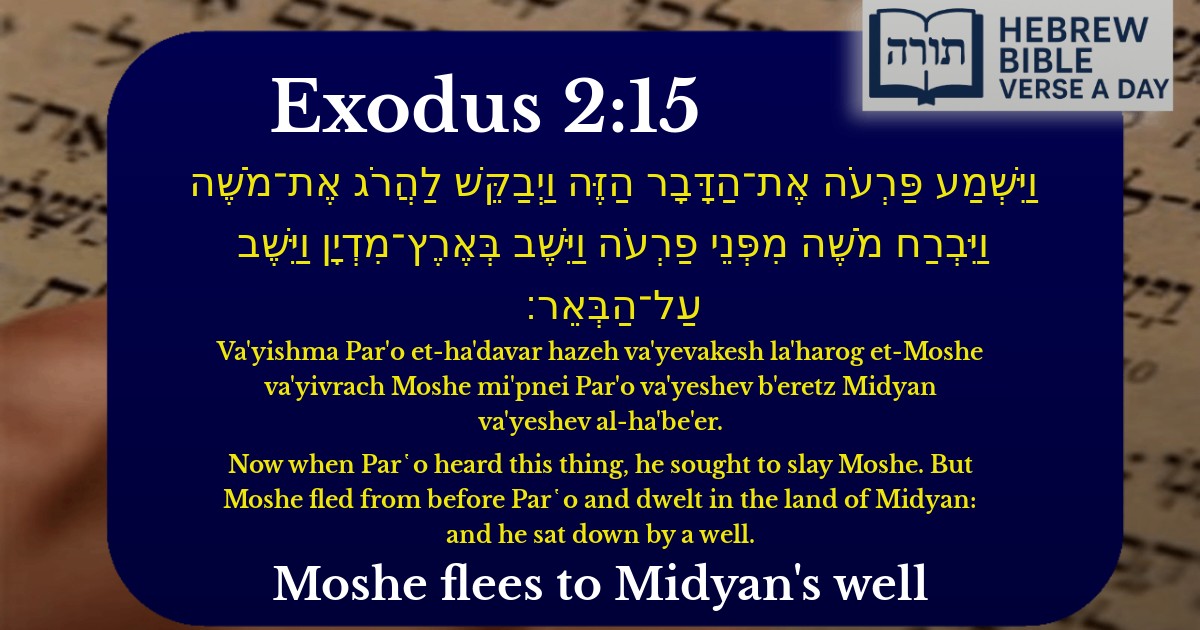Join Our Newsletter To Be Informed When New Videos Are Posted
Join the thousands of fellow Studends who rely on our videos to learn how to read the bible in Hebrew for free!
Hebrew Text
וַיִּשְׁמַע פַּרְעֹה אֶת־הַדָּבָר הַזֶּה וַיְבַקֵּשׁ לַהֲרֹג אֶת־מֹשֶׁה וַיִּבְרַח מֹשֶׁה מִפְּנֵי פַרְעֹה וַיֵּשֶׁב בְּאֶרֶץ־מִדְיָן וַיֵּשֶׁב עַל־הַבְּאֵר׃
English Translation
Now when Par῾o heard this thing, he sought to slay Moshe. But Moshe fled from before Par῾o and dwelt in the land of Midyan: and he sat down by a well.
Transliteration
Va'yishma Par'o et-ha'davar hazeh va'yevakesh la'harog et-Moshe va'yivrach Moshe mi'pnei Par'o va'yeshev b'eretz Midyan va'yeshev al-ha'be'er.
Hebrew Leining Text
וַיִּשְׁמַ֤ע פַּרְעֹה֙ אֶת־הַדָּבָ֣ר הַזֶּ֔ה וַיְבַקֵּ֖שׁ לַהֲרֹ֣ג אֶת־מֹשֶׁ֑ה וַיִּבְרַ֤ח מֹשֶׁה֙ מִפְּנֵ֣י פַרְעֹ֔ה וַיֵּ֥שֶׁב בְּאֶֽרֶץ־מִדְיָ֖ן וַיֵּ֥שֶׁב עַֽל־הַבְּאֵֽר׃
וַיִּשְׁמַ֤ע פַּרְעֹה֙ אֶת־הַדָּבָ֣ר הַזֶּ֔ה וַיְבַקֵּ֖שׁ לַהֲרֹ֣ג אֶת־מֹשֶׁ֑ה וַיִּבְרַ֤ח מֹשֶׁה֙ מִפְּנֵ֣י פַרְעֹ֔ה וַיֵּ֥שֶׁב בְּאֶֽרֶץ־מִדְיָ֖ן וַיֵּ֥שֶׁב עַֽל־הַבְּאֵֽר׃
🎵 Listen to leining
Parasha Commentary
📚 Talmud Citations
This verse is not quoted in the Talmud.


Pharaoh's Reaction and Moshe's Flight
The verse states that Pharaoh sought to kill Moshe after hearing "this thing" (הַדָּבָר הַזֶּה). Rashi explains that "this thing" refers to Moshe killing the Egyptian taskmaster who was beating a Hebrew slave (Shemot 2:11-12). When the matter became known, Pharaoh sought retribution. The Midrash (Shemot Rabbah 1:31) adds that Moshe was reported to Pharaoh by Datan and Aviram, who later became notorious antagonists during the Exodus.
Moshe's Escape to Midyan
Moshe fled to Midyan, which the Ramban notes was a providential occurrence, as it led to his encounter with Yisro's daughters and his eventual role as shepherd of Yisro's flock—a preparation for leading the Jewish people. The Sforno emphasizes that Moshe's flight demonstrated his humility, as he did not rely on his royal upbringing to protect him from Pharaoh's wrath.
Symbolism of the Well
The verse concludes with Moshe sitting by a well (עַל־הַבְּאֵר), which the Baal HaTurim connects to future events: just as he met his future wife Tzipporah at a well, so too would Yaakov and Eliezer meet their destined matches at wells (Bereishit 24:11, 29:2). The Talmud (Sotah 43b) also associates wells with Torah, suggesting this moment foreshadowed Moshe's future role in receiving the Torah at Har Sinai.